How to Prepare for Buying an Electric Car
September 8, 2020
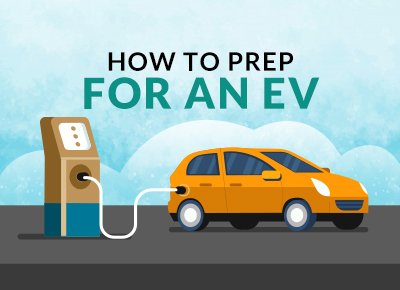

Steve Birkett is an electric vehicle advocate based in Greater Boston, Massachusetts. He is a content creator and marketing professional who contributes written and recorded pieces to a wide range of media outlets. His analysis has been featured in Find The Best Car Price, WWLP TV, and Torque News, among others. He has also had video content featured on Inside EVs. Birkett was an EV Guide for Plug in America events in Massachusetts (Drive Electric Cambridge and Drive Electric Lowell) and Ohio (Earth Day 2019 at Cleveland Zoo). He participates in quarterly advisory panel meetings for EVolve New York (a state-level charging initiative) and has contributed to focus groups for prominent U.S. charging networks.
Birkett is a father-of-two who loves nothing more than packing up the family and hitting the road in their latest electric car, which is currently a 2022 Hyundai IONIQ 5. With multiple Chevy Bolts in his past, as well as a Chevy Volt and Tesla Model 3 LR in the extended family, plus various EV rentals when he ventures back home to his native United Kingdom, Birkett has more than 100,000 all-electric miles under his belt and is always ready to try out a new electric vehicle.
For press inquiries, contact steve@findthebestcarprice.com
As awareness increases about the low running costs and rapidly expanding capabilities of electric vehicles (EVs), buying an electric car is becoming a reality for more and more Americans. With that decision comes the transition to a new way of powering our primary means of transportation.
Although this change is not as challenging as some claim, understanding the current capabilities and infrastructure around EVs goes a long way to making the switch less jarring. Learn more about what you need to know before switching to an electric car.
This article will look at some of the things you can do to prepare for the transition to all-electric driving.
Table of Contents
What Should You Watch for When Buying an Electric Car?
Here are five things you should do as you prepare for buying an electric car:
- Confirm how much range you need
- Consider up-front price vs. total cost of ownership (TCO)
- Identify charging locations
- Remember the weather
- Investigate incentives (and fees)
Let’s take a look at each of these important considerations to make your experience buying an electric car that much easier.
Consider EV Range
Although “range anxiety” is a term commonly associated with the EV purchase process, the reality of driving an electric car is that you won’t run out of juice unless you’re intentionally pushing the car to its limits. However, a little extra effort spent on researching your range needs before you buy an electric car will help ensure you never have to cut it close unless you choose to.
The most recent generation of EVs come equipped with battery packs that can squeeze between 200-300 miles out of a single charge, depending how and where you drive them. That covers all but the most extended commute before you return home to charge (more on that later), so range often comes down to how many road trips you intend to take in your all-electric ride.
So, how much range do you need?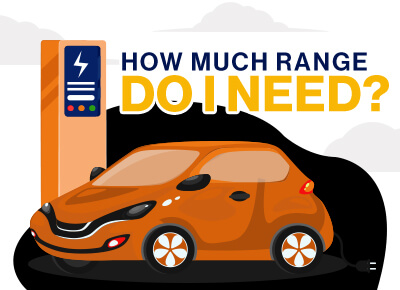
Various scenarios play into answering this question. If you have a second vehicle in the driveway that brings the current benefits of gasoline (faster refueling and greater range between stops), almost any EV makes sense. Some drivers love their electric cars for commuter use and local driving, but choose to sidestep the current limitations of long-distance EV travel (planning charge stops, waiting longer for a charge) by taking a gas car for those journeys.
For the average commuter, that means that a lower range EV like the entry-level Nissan Leaf or the MINI Cooper SE will suffice. Both of these offer somewhere in the region of 150 miles per charge and typically come in at a lower price point than models with greater range, making them a solid choice in this scenario.
If you’re purchasing an electric car to become an EV-only household, your range requirements are likely to be much higher. While a Tesla is the obvious choice for the most convenient EV road trips, models like the latest Chevrolet Bolt EV, Kia Niro EV, and Hyundai Kona Electric all offer more than 250 miles to keep you on the road for longer before stopping to charge. If the limited charge speed of those vehicles becomes a stumbling block, more upmarket options like the Audi e-Tron and Polestar 2 will cut those charge breaks almost in half.
In the years to come, range and charging speed will get very close to the equivalent of gasoline-powered vehicles. In the meantime, there are suitable all-electric options for almost every location and use case, as long as the buyer understands how many miles they really put on their vehicle in any given week.
Consider Cost of EV Ownership
As you start to look at the initial price of buying an electric car, sticker shock is real. It's not uncommon for the price of an EV at the affordable end of the market to be up to $10,000 higher than a comparable gasoline-powered counterpart, which can understandably put off some buyers.
Not so fast!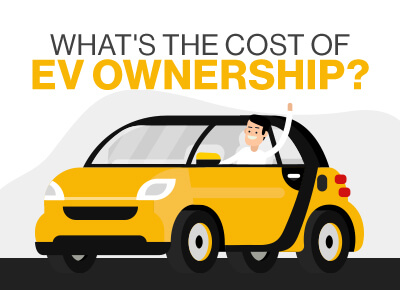
Remember that with electric vehicles, thanks to fewer moving parts and a more flexible source of "fuel," the cost savings mount up over time. No more oil changes, far less wear on brake pads, and fewer service visits for under the hood maintenance makes running an EV a much simpler prospect.
RELATED: Even more reasons to buy an electric car.
Even if you don't factor in the value of the time you won't be spending at the service center, these maintenance cost savings add up to hundreds of dollars every year, or even thousands in the case of a catastrophic combustion engine failure. Put simply, there's much less that can go wrong in an electric vehicle. Even the expensive battery packs, which some buyers are concerned about, have a guarantee of 100k miles - or eight years, if that comes sooner - and are proving capable of going much further in most all-electric models.
Running costs drop further still for anyone driving in a market where gasoline remains expensive and/or electricity is especially cheap. For those with solar panels already installed at home, buying an electric car can easily wipe out fuel costs for anything other than long trips. Even for those with a regular electricity price of $0.10-0.15 per kWh, filling up costs less than $10 and drivers regularly see costs of less than $0.05 per mile. That's a number that only the most efficient gas-sipping hybrid drivetrains can achieve, which an EV will deliver without limiting performance or driving style.
Ultimately, it could take several years of driving to realize these cost savings. For now, customers should be aware that the long term benefits of buying an electric car come at the price of paying more up front and set their budget accordingly.
Consider EV Charging Locations
"Where will I charge it?" is one of the most common questions asked by anyone considering an electric car. For most, the answer is a surprisingly simple "in the driveway," and convenient home charging becomes one of the biggest benefits of owning an EV. Emphasizing that point, a recent study by the National Renewable Energy Laboratory highlighted that 81% of charging occurs at home. A further 14% of charging is accomplished at convenient local charge locations such as the workplace or a retail center, leaving only 5% of charging for more costly DC fast charging locations.
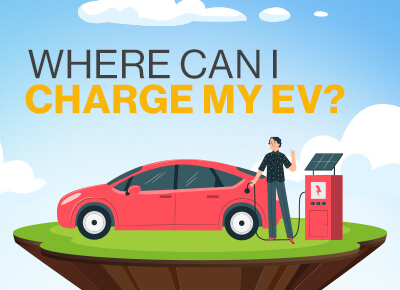 For buyers with no access to home charging, however, or those who make regular long trips outside of the car's range on a single charge, the public charging network becomes more important.
For buyers with no access to home charging, however, or those who make regular long trips outside of the car's range on a single charge, the public charging network becomes more important.
The good news is that EV charging options are expanding rapidly. Tesla, of course, comes with its own Supercharger network to make things easy, but even non-Tesla electric vehicles now have a wealth of options in many parts of the United States. As of May 2020, the US Department of Energy (DOE) confirmed almost 70,000 charging stations across the country, 84% of which are the usually inexpensive level 2 AC charging variety.
Taking the time to browse a tool like Plugshare or Chargeway to identify where those charging stations are in your area is well worth the effort. For many potential EV buyers, this search will uncover a wide range of places to charge affordably and conveniently away from home, making the transition to driving electric that little bit easier.
Consider the Effect of Extreme Weather
Much like their combustion counterparts, electric cars experience diminished performance and efficiency in extreme weather conditions. Unlike gasoline vehicles, thanks to superior energy measurement software and the early adopter focus on range, EV drivers tend to be acutely aware of how those conditions impact their ride.
 Depending on the model selected when buying an electric vehicle, the effect of a harsh winter or scorching summer can range from minor consideration to major inconvenience. If the EV in question has a heat pump, for example, those days with below freezing temperatures will only have a small impact on range. If the car has a resistive heater, however, it’s going to suck up electrons that the driver would prefer to put to the road. At the other end of the spectrum, an electric car with active thermal management of the battery pack will barely register a hot summer, while an EV reliant on air cooling could see its battery start to bake and struggle to use a fast charge station.
Depending on the model selected when buying an electric vehicle, the effect of a harsh winter or scorching summer can range from minor consideration to major inconvenience. If the EV in question has a heat pump, for example, those days with below freezing temperatures will only have a small impact on range. If the car has a resistive heater, however, it’s going to suck up electrons that the driver would prefer to put to the road. At the other end of the spectrum, an electric car with active thermal management of the battery pack will barely register a hot summer, while an EV reliant on air cooling could see its battery start to bake and struggle to use a fast charge station.
In reality, the convenience of home charging and the relatively short distance of the average US commute mean that most of today’s long range EVs will breeze through a daily drive, whatever the weather. For those looking at an electric car with lower range, however, or those who live in parts of the country with extreme winters or summers, choosing a model that can handle the local climate becomes an important consideration.
Consider the Incentives Available (and Registration Fees Added)
The desire to accelerate the shift to cleaner personal transportation has resulted in a wide range of incentives available to anyone buying an electric car. From the federal tax credit of up to $7,500 on some models, to state-level rebates and discounts on EV-related essentials like charging stations and energy tariffs, there can be a lot of money on the table to make your electric car more affordable. Before you choose a model or purchase location, be sure to read our guide to electric car tax incentives still available in 2020.
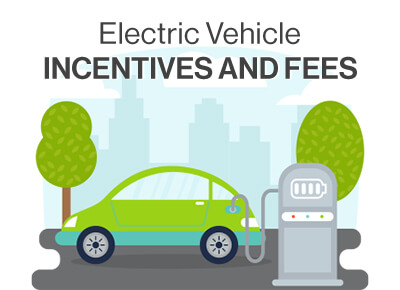 On the other hand, some states have realized that an increasing number of EVs means fewer drivers paying gas tax at the pump. Understandably, some of them have moved to plug this potential revenue gap before it grows too large. EV registration fees range from nominal in a state like Colorado, which charges an annual fee of $50 for all battery-electric vehicles and plug-in hybrids alike, to an eye-watering $200 per year for all-electric cars registered in Georgia and Ohio.
On the other hand, some states have realized that an increasing number of EVs means fewer drivers paying gas tax at the pump. Understandably, some of them have moved to plug this potential revenue gap before it grows too large. EV registration fees range from nominal in a state like Colorado, which charges an annual fee of $50 for all battery-electric vehicles and plug-in hybrids alike, to an eye-watering $200 per year for all-electric cars registered in Georgia and Ohio.
While the incentives typically dwarf the registration fees - and both factors are subject to change as administrations change and new legislation is passed - it’s important to prepare for buying an electric car by knowing what incentives are available and the fees you’ll be paying before you negotiate a deal. Also, check out our post on affordable EVs to watch for.
Armed with the right information, switching to an electric vehicle can save you time, money, and even revitalize your love of daily driving. Use the recommendations above to prepare yourself for buying an electric car, then take a look at our suggestions for some of the best electric car deals around right now. And, once you buy the car, make sure you name your electric vehicle something worth remembering.
Best Car Deals by Category
Frequently Asked Questions
What are some cheapest electric car models available right now?
For the average commuter, that means that a lower range EV like the entry-level Nissan Leaf or the MINI Cooper SE will suffice. Both of these offer somewhere in the region of 150 miles per charge and typically come in at a lower price point than models with greater range, making them a solid choice in this scenario.
How many miles can I get out of a single charge?
The most recent generation of EVs come equipped with battery packs that can squeeze between 200-300 miles out of a single charge, depending how and where you drive them.
Is it more expensive to buy and maintain an electric car?
Remember that with electric vehicles, thanks to fewer moving parts and a more flexible source of "fuel," the cost savings mount up over time. No more oil changes, far less wear on brake pads, and fewer service visits for under the hood maintenance makes running an EV a much simpler prospect.
Where can I charge my electric car?
Taking the time to browse a tool like Plugshare or Chargeway to identify where those charging stations are in your area is well worth the effort. For many potential EV buyers, this search will uncover a wide range of places to charge affordably and conveniently away from home, making the transition to driving electric that little bit easier.
Does weather affect the performance of an electric vehicle?
Much like their combustion counterparts, electric cars experience diminished performance and efficiency in extreme weather conditions. Unlike gasoline vehicles, thanks to superior energy measurement software and the early adopter focus on range, EV drivers tend to be acutely aware of how those conditions impact their ride.
Posted in Car Buying Tips, Electric and Hybrid Vehicles |




